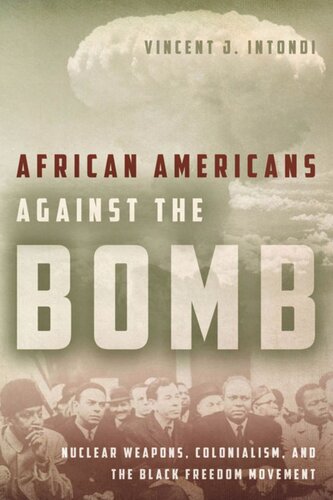

Most ebook files are in PDF format, so you can easily read them using various software such as Foxit Reader or directly on the Google Chrome browser.
Some ebook files are released by publishers in other formats such as .awz, .mobi, .epub, .fb2, etc. You may need to install specific software to read these formats on mobile/PC, such as Calibre.
Please read the tutorial at this link: https://ebookbell.com/faq
We offer FREE conversion to the popular formats you request; however, this may take some time. Therefore, right after payment, please email us, and we will try to provide the service as quickly as possible.
For some exceptional file formats or broken links (if any), please refrain from opening any disputes. Instead, email us first, and we will try to assist within a maximum of 6 hours.
EbookBell Team

5.0
108 reviewsWell before Rev. Dr. Martin Luther King, Jr. spoke out against nuclear weapons, African Americans were protesting the Bomb. Historians have generally ignored African Americans when studying the anti-nuclear movement, yet they were some of the first citizens to protest Truman's decision to drop atomic bombs in Hiroshima and Nagasaki in 1945. Now for the first time, African Americans Against the Bomb tells the compelling story of those black activists who fought for nuclear disarmament by connecting the nuclear issue with the fight for racial equality.
Intondi shows that from early on, blacks in America saw the use of atomic bombs as a racial issue, asking why such enormous resources were being spent building nuclear arms instead of being used to improve impoverished communities. Black activists' fears that race played a role in the decision to deploy atomic bombs only increased when the U.S. threatened to use nuclear weapons in Korea in the 1950s and Vietnam a decade later. For black leftists in Popular Front groups, the nuclear issue was connected to colonialism: the U.S. obtained uranium from the Belgian controlled Congo and the French tested their nuclear weapons in the Sahara.
By expanding traditional research in the history of the nuclear disarmament movement to look at black liberals, clergy, artists, musicians, and civil rights leaders, Intondi reveals the links between the black freedom movement in America and issues of global peace. From Langston Hughes through Lorraine Hansberry to President Obama, African Americans Against the Bomb offers an eye-opening account of the continuous involvement of African Americans who recognized that the rise of nuclear weapons was a threat to the civil rights of all people.